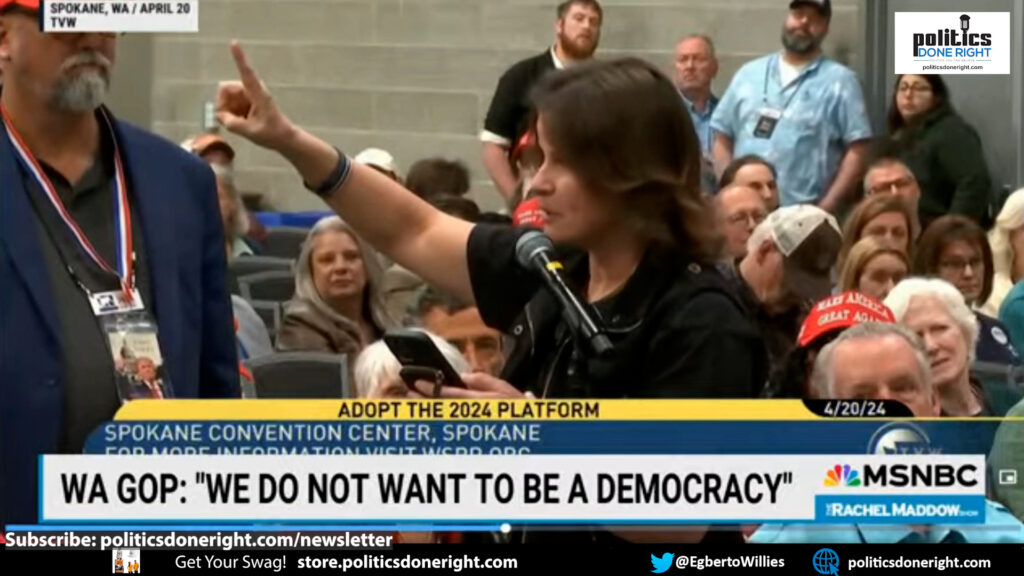Many claim that Democrats and Progressives are exaggerating when they claim a Trump/Republican win puts democracy in danger. Guess what? They admit it!
Is democracy a bad idea?
Podcasts (Video — Audio)
The discourse around American democracy often ignites partisan debate, with recent developments in Washington state illuminating a particularly stark vision of the Republican Party’s stance on democratic governance. At the Washington State Republican convention, a declaration was made that seemingly undermines the foundational democratic principles of the United States. The assembled delegates voted to add to their party platform a stance that explicitly opposes direct democracy for electing senators and favors retaining an Electoral College-like system for presidential elections.
This move by the Washington GOP to publicly renounce the principles of direct democracy is not merely a local political maneuver; it reflects a broader ideological divide within the United States. The rejection of direct democracy, including opposing the popular vote in presidential elections and the direct election of senators as per the 17th Amendment, frames a narrative that the GOP perceives democracy not as a vehicle for representing the will of the majority but as a threat to their political agenda.
Such positions from the Washington GOP come at a critical time when faith in the electoral process and democratic institutions is alarmingly low. Many Republicans, as indicated by these platform changes, argue that America is a republic. This statement is technically correct but often used to justify systems that do not reflect the people’s current demographic and political will. By advocating for a republic that limits direct public influence on government, the Washington GOP is signaling a preference for a more controlled, less participatory model of governance where minority rule can be maintained through structural advantages.
This stance raises profound ethical and political questions about the future of American governance. On the one hand, the insistence on a republic that restricts direct democracy is historically grounded in the American constitutional framework, which was designed to balance between majority rule and the protection of individual and minority rights. However, the application of this principle in the 21st century, where demographic shifts and political engagement have transformed public expectations of governance, seems increasingly at odds with the foundational democratic principle of government by the people.
The implications of such a platform are vast. It suggests a strategic withdrawal from the principles of equal representation and majority rule in favor of a system that can safeguard political power for a select group. This approach not only challenges the evolution of American democracy but also contradicts the expanding global understanding of democracy as inclusive and representative.
A few years ago, I wrote the article “Republicans are setting up the courts for minority rule even in a more progressive country.” In it, I argued that the GOP knew it had become a party that could not win an election. Their only option was to commandeer the only non-democratic portion of our government, the judiciary. And they busted the filibuster to do it.
The Washington GOP’s explicit rejection of democracy as a concept aligns with a troubling trend in American politics where democratic norms are being questioned and eroded. It is essential for the public, and particularly for progressive forces, to scrutinize these developments and vigorously defend democratic principles. Democrats and progressives often remind the public of these foundational elements during elections, emphasizing the need for policies that reflect the majority’s will and safeguarding democratic institutions against such regressive changes.
The actions of the Washington State Republican Party are a stark reminder of the ongoing struggle over the soul of American democracy. As the nation approaches future elections, the discourse around democracy, republicanism, and voters’ rights will undoubtedly intensify. Progressives must continue to highlight these issues, advocate for expansive democratic practices, and ensure that the public is fully informed about the implications of political platforms that seek to diminish direct democratic participation. This is not merely a battle of ideologies but a crucial fight for the nation’s future direction, where every citizen’s voice should count, and the majority’s will should not be stifled by procedural barriers.
Viewers are encouraged to subscribe and join the conversation for more insightful commentary and to support progressive messages. Together, we can populate the internet with progressive messages that represent the true aspirations of most Americans.

